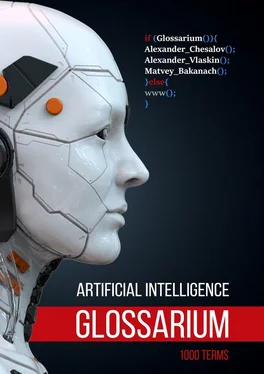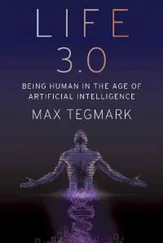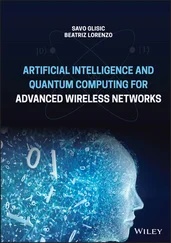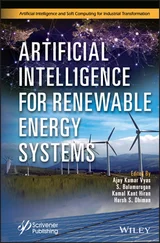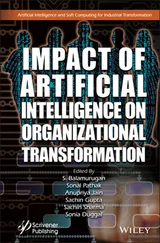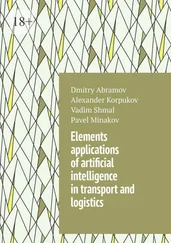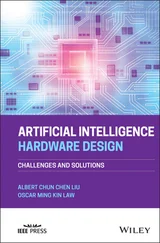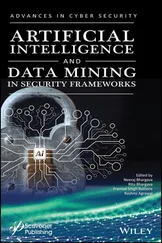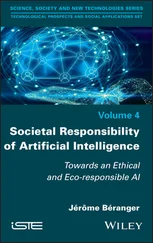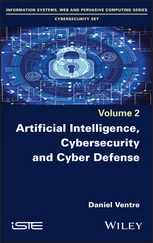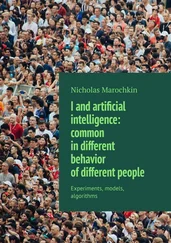We continue to work on improving the quality and content of the text of this book, including supplementing it with new knowledge in the subject area. We will be grateful for any feedback, suggestions and clarifications. Please send them to aleksander.chesalov@yandex.ru
Happy reading and productive work!
Yours, Alexander Chesalov, Alexander Vlaskin and Matvey Bakanach.
09/22/2022
ARTIFICIAL INTELLIGENCE GLOSSARY
A/B Testing (A/B-тестирование) –A statistical way of comparing two (or more) techniques, typically an incumbent against a new rival. A/B testing aims to determine not only which technique performs better but also to understand whether the difference is statistically significant. A/B testing usually considers only two techniques using one measurement, but it can be applied to any finite number of techniques and measures [ 13 13 A/B Testing [Электронный ресурс] // vwo.com URL: https://vwo.com/ab-testing/ (дата обращения: 28.01.2022)
].
Abductive logic programming (ALP) (Абдуктивное логическое программирование) –A high-level knowledge-representation framework that can be used to solve problems declaratively based on abductive reasoning. It extends normal logic programming by allowing some predicates to be incompletely defined, declared as adducible predicates [ 14 14 Abductive Logic Programming (ALP) [Электронный ресурс] // engati.com URL https://www.engati.com/glossary/abductive-logic-programming (дата обращения 14.02.2022)
].
Abductive reasoning (Also abduction) (Абдукция) —A form of logical inference which starts with an observation or set of observations then seeks to find the simplest and most likely explanation. This process, unlike deductive reasoning, yields a plausible conclusion but does not positively verify it. abductive inference, or retroduction [ 15 15 Abductive reasoning [Электронный ресурс] // MRS BLOG URL: http://msrblog.com/science/mathematic/about-abductive-reasoning.html (дата обращения 14.02.2022)
].
Abstract data type (Абстрактный тип данных) —A mathematical model for data types, where a data type is defined by its behavior (semantics) from the point of view of a user of the data, specifically in terms of possible values, possible operations on data of this type, and the behavior of these operations [ 16 16 Abstract data type [Электронный ресурс] // EMBEDDED ARTISTRY URL: https://embeddedartistry.com/fieldmanual-terms/abstract-data-type/ (дата обращения 14.02.2022)
].
Abstraction (Абстракция) —The process of removing physical, spatial, or temporal details or attributes in the study of objects or systems in order to more closely attend to other details of interest.
Accelerating change (Ускорение изменений) —A perceived increase in the rate of technological change throughout history, which may suggest faster and more profound change in the future and may or may not be accompanied by equally profound social and cultural change [ 17 17 Accelerating change [Электронный ресурс] // ru.knowledgr.com (дата обращения: 14.02.2022)
].
Access to information (Доступ к информации) – the ability to obtain information and use it.
Access to information constituting a commercial secret (Доступ к информации, составляющей коммерческую тайну) – familiarization of certain persons with information constituting a commercial secret, with the consent of its owner or on other legal grounds, provided that this information is kept confidential.
Accuracy (Точность) –The fraction of predictions that a classification model got right.
Action (Действие) –In reinforcement learning, the mechanism by which the agent transitions between states of the environment. The agent chooses the action by using a policy.
Action language (Язык действий) —A language for specifying state transition systems, and is commonly used to create formal models of the effects of actions on the world. Action languages are commonly used in the artificial intelligence and robotics domains, where they describe how actions affect the states of systems over time, and may be used for automated planning [ 18 18 https://www.semanticscholar.org/topic/Action-language/72365
].
Action model learning (Обучение модели действий) – An area of machine learning concerned with creation and modification of software agent’s knowledge about effects and preconditions of the actions that can be executed within its environment. This knowledge is usually represented in logic-based action description language and used as the input for automated planners [ 19 19 Action model learning [Электронный ресурс] // Semantic Scholar URL: https://www.semanticscholar.org/topic/Action-model-learning/1677625 (дата обращения 14.02.2022)
].
Action selection (Выбор действия) —A way of characterizing the most basic problem of intelligent systems: what to do next. In artificial intelligence and computational cognitive science, “the action selection problem” is typically associated with intelligent agents and animats – artificial systems that exhibit complex behaviour in an agent environment [ 20 20 Action selection [Электронный ресурс] // https://www.netinbag.com/ URL: https://www.netinbag.com/ru/internet/what-is-action-selection.html (дата обращения: 18.02.2022)
].
Activation function (Функция активации нейрона) –In the context of Artificial Neural Networks, a function that takes in the weighted sum of all of the inputs from the previous layer and generates an output value to ignite the next layer [ 21 21 https://appen.com/ai-glossary/
].
Active Learning/Active Learning Strategy (Активное обучение/ Стратегия активного обучения) –is a special case of Semi-Supervised Machine Learning in which a learning agent is able to interactively query an oracle (usually, a human annotator) to obtain labels at new data points. A training approach in which the algorithm chooses some of the data it learns from. Active learning is particularly valuable when labeled examples are scarce or expensive to obtain. Instead of blindly seeking a diverse range of labeled examples, an active learning algorithm selectively seeks the particular range of examples it needs for learning.
Adam optimization algorithm (Алгоритм оптимизации Адам) –it is an extension of stochastic gradient descent which has recently gained wide acceptance for deep learning applications in computer vision and natural language processing [ 22 22 Adam optimization algorithm [Электронный ресурс] // archive.org URL: https://archive.org/details/riseofexpertcomp00feig (дата обращения: 11.03.2022)
].
Adaptive algorithm (Адаптивный алгоритм) –An algorithm that changes its behavior at the time it is run, based on a priori defined reward mechanism or criterion [ 23 23 Adaptive algorithm. [Электронный ресурс] // dic.academic.ru (дата обращения: 27.01.2022)
].
Читать дальше
